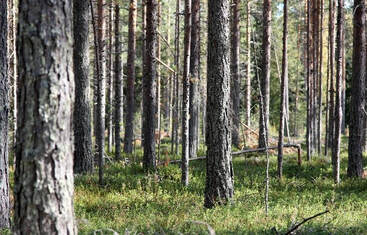 Pine Forest industrially Managed
Pine Forest industrially Managed
Founders Thoughts - Why "Advocates for Responsible Sustainability"
Providing a Forum and a Voice
FEATURE ARTICLE - Founding ARS
Why I am starting “Advocates for Responsible Sustainability”
My career path has been 43 years, mostly as a Research Scientist, first researching the structure of cellulose, one of the world’s most abundant biopolymers, then in additive development for use in the Pulp and Paper industry (PPI). I have enjoyed my technical career immensely working on new product developments, applications, and improved processes, all leading to eventual leadership of technical programs and laboratories. Invention, writing patents, leading the effort to bring new scientists to the organization, and managing efforts to search worldwide for related technologies, all proceeded retirement from fulltime technical leadership in 2018.
In my several roles, I had the privilege of participating in high level Technical Association and Academic meetings, featuring technical leaders from the worldwide pulp and paper industry. Topics ranged from the newest industry technical developments, to government efforts to support industry technical growth, to ways to enhance the understanding and perception of the industry and its potential to be an exemplar of sustainability. Technical developments have allowed the PPI to become one of the most environmentally compatible, and effective biomaterials based industries, including leadership in recycling and use of renewable materials.
Producing 420 million metric tons of product annually worldwide, the industry meets the many consumer needs for packaging, communication, and consumer papers. In many regions, the industry and its allies produce more biomass than it consumes. The industry has a solid story and history that, while it is still being written and refined, is for the most part a story worth building on. It is one of the few industries that can reasonably be described as potentially Responsibly Sustainable. Yet, for many consumers the perception goes no deeper than that it is an industry that cuts down trees. Changing that perception through education and inclusion of consumers should be a primary industry goal.
My interest in promoting the broader story of the pulp and paper industry, as one of the uniquely potentially sustainable industrial activities, came into focus in the latter years of my career as I was serving as my firms Manager for External Technology. My role was to guide efforts to find technologies being developed outside of our company that might be brought into valued use in the PPI. That role involved frequent contact with industry technical leaders who often were in similar roles. In particular these leaders were active in seeking out research opportunities that could be supported industry wide, without issues of competitive conflict or antitrust. Research that would be pre-competitive, leading to a more basic understanding of the industries products and processes. that all industry partners could take advantage of. Much of the research is aimed to improve the industries competitiveness and to enhance its sustainability. These leaders and their colleagues are experts in the industries role in the world, the technologies used and products produced, and in minimizing environmental impacts from the industry. Many had been key developers of technologies that made the modern PPI one of the most environmentally compliant industries. To a person they were and are genuinely concerned with doing good science and improving and promoting their industry.
While not as directly active, I also became a sometimes contributor and an often supporter of several of the key national foundations and groups supporting environmental protection. Within the technical Associations supporting the PPI, representatives from industry come together with persons from the government laboratories and environmental groups that support both the industry and developing environmental regulations.
Through these experiences I began to notice several things. First, almost all of the participants in these meetings were dedicated, talented, and hard working professionals. Most were engineers or scientists but some were business managers and some were lawyers. Occasionally a politician, government lab manager, or a political appointee participated, along with many academics and some graduate students preparing for technical careers in the industry or academia.
A second observation, not unexpected, is that all the professional participants genuinely work to improve the industry and environment; improving process efficiency, product performance, environmental compliance, and sustainability. But also, not unexpected, most of these dedicated professionals, first focus on and support research related to the goals of their own supporting organization, as they should. And so it is not unexpected that when industry and environmental participants return to their respective sponsors, the considerations that they bring back are related to their own benefactor’s interests, which may at times be polar opposite objectives. The middle ground, the space where these groups, sometimes with polar interests, may find common interests, is often not well represented, or even considered, in their respective technical and institutional efforts.
Finally, while it is not often a primary consideration in the technical meetings and technical developments that the industry and related organizations work towards, it is important to note that the consumers and customers are also partners in these considerations. Not just through their interest in better and less expensive products, but also through their interest in the future for themselves and their families. The paper and forest products industries are large industries, impacting significant amounts of the earth’s resources, and thus their stewardship of these resources is vital.
The industries customers, and all humanity, our friends and neighbors, while critically interested, are often not represented in the industries technical developments and often do not have a voice. Advocates for Responsible Sustainability is being developed to bring all parties together; industrialists, environmentalists, academics, and customers, consumers, friends, and families, and to give them a forum for discussion and a voice. It is for all of our futures.
Respectfully submitted with hope,
John Gast
